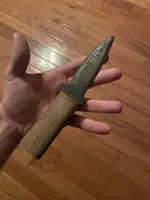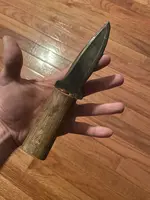You are using an out of date browser. It may not display this or other websites correctly.
You should upgrade or use an alternative browser.
You should upgrade or use an alternative browser.
The Knife Collection
- Thread starter Whynotnow?
- Start date
Whynotnow?
Bronze Member
- Joined
- Jul 7, 2022
- Messages
- 1,046
- Reaction score
- 2,162
- Golden Thread
- 0
- Location
- North Carolina
- Primary Interest:
- All Treasure Hunting
- #22
Thread Owner
That's very cool!This one is a sheppards knife, the spike is actualy used to puncture the belly of a bloated animal, to save its life.
View attachment 2141617
Whynotnow?
Bronze Member
- Joined
- Jul 7, 2022
- Messages
- 1,046
- Reaction score
- 2,162
- Golden Thread
- 0
- Location
- North Carolina
- Primary Interest:
- All Treasure Hunting
- #23
Thread Owner
It’s cool how similar knives can be for different things. Reminds me of this mariners knife. The spike on this one is for untying knots.This one is a sheppards knife, the spike is actualy used to puncture the belly of a bloated animal, to save its life.
View attachment 2141617
Old Handmade approx. 6-inch knife, wood handle 2 7/8 inches in length, blade 3 1/8 inches in length. Sturdy, with copper rivets holding the handle to the blade. Possibly made from an old file.
This is an old and used handmade knife in highly collectible condition. From the Nickolas Starr collection.




This is an old and used handmade knife in highly collectible condition. From the Nickolas Starr collection.
Old late1800's approximately 9-inch knife with sheath, 4.5-inch wood handle with what appears to be copper rivets, blade 4.5 inches in length, leather sheath. Blade appears to be made from an old file, is thick and extends to the butt of the handle. This is a handmade knife. The knife handle is tight.



Whynotnow?
Bronze Member
- Joined
- Jul 7, 2022
- Messages
- 1,046
- Reaction score
- 2,162
- Golden Thread
- 0
- Location
- North Carolina
- Primary Interest:
- All Treasure Hunting
- #27
Thread Owner
Old Handmade approx. 6-inch knife, wood handle 2 7/8 inches in length, blade 3 1/8 inches in length. Sturdy, with copper rivets holding the handle to the blade. Possibly made from an old file.
This is an old and used handmade knife in highly collectible condition. From the Nickolas Starr collection.
View attachment 2141683
View attachment 2141684View attachment 2141685
View attachment 2141687
Now those are some beautiful pieces, thanks for sharing! My only handmade knife was made by me when I was twelve with a lawnmower blade lol.Old late1800's approximately 9-inch knife with sheath, 4.5-inch wood handle with what appears to be copper rivets, blade 4.5 inches in length, leather sheath. Blade appears to be made from an old file, is thick and extends to the butt of the handle. This is a handmade knife. The knife handle is tight.
View attachment 2141688
View attachment 2141689View attachment 2141690
Attachments
It looks a lot like a marlin spike.This one is a sheppards knife, the spike is actualy used to puncture the belly of a bloated animal, to save its life.
View attachment 2141617
Joecoins
Hero Member
It does look similar but actually is designed for a very different purpose. I think it was called a trucar spike. My knife posted is apparently a very old laguiole type knife.
Black foot this one you just posted is most similar. Got any more photos of the spine and the other side?
Black foot this one you just posted is most similar. Got any more photos of the spine and the other side?
No, sorry. I found that photo on-line and used it as an exampleIt does look similar but actually is designed for a very different purpose. I think it was called a trucar spike. My knife posted is apparently a very old laguiole type knife.
Black foot this one you just posted is most similar. Got any more photos of the spine and the other side?
Joecoins
Hero Member
To understand the true purpose of this tool you first need to know that the Laguiole knife was a Cattlemen's tool. As most retailers will make you believe by ignorance or for marketing purpose, the Awl sole purpose is not to punch holes or to take knots out; it is a rudimentary "Trocar".
Most of us who did not spend years in medical school do not know what a Trocar is; it is a surgical instrument that is used to puncture body cavities. Now, you may ask your self why a cattlemen would need such an instrument, here is why: Herds of cattle do not always stay in their assigned fields, although the dogs usually keep them put, they do escape from time to time. The worse fields a cow can escape too are the ones that contain "Luzerne" AKA "Alfalfa"
Luzerne is a legume or a plant that produces nitrogen by means of its root system. This is what contributes to an animal's suffering from "bloat" if they eat too much of it, or eat it at a particular time, i.e., when the grass is damp and young (young grass contains proportionately more of the toxin).
"Bloat" is the technical name for what happens, i.e., the animal "blows up" or "bloats" from the gas produced in its rumen (which is one of the four compartments of its digestive system). If the bloat is not relieved on time the cattlemen will loose his herd as most animals will succumb to internal stomach pressure.
The only way to save the animal was to puncture the stomach to relieve the pressure, so the French shepherds used whatever was at hand, including pieces of barbed wire, nails, or sharp sticks until the Awl was integrated to their knives.
The Awl's shape and size was designed to assure that the cattlemen would not injure the animal by inserting the awl too deep, the tapered triangular angles of the awl are made to create a "clean" whole, not a slash. The notches often found on various models are purely decorative.
Source: https://www.laguiole-imports.com/en-ca/pages/what-is-a-laguiole-3-piece-knife
Most of us who did not spend years in medical school do not know what a Trocar is; it is a surgical instrument that is used to puncture body cavities. Now, you may ask your self why a cattlemen would need such an instrument, here is why: Herds of cattle do not always stay in their assigned fields, although the dogs usually keep them put, they do escape from time to time. The worse fields a cow can escape too are the ones that contain "Luzerne" AKA "Alfalfa"
Luzerne is a legume or a plant that produces nitrogen by means of its root system. This is what contributes to an animal's suffering from "bloat" if they eat too much of it, or eat it at a particular time, i.e., when the grass is damp and young (young grass contains proportionately more of the toxin).
"Bloat" is the technical name for what happens, i.e., the animal "blows up" or "bloats" from the gas produced in its rumen (which is one of the four compartments of its digestive system). If the bloat is not relieved on time the cattlemen will loose his herd as most animals will succumb to internal stomach pressure.
The only way to save the animal was to puncture the stomach to relieve the pressure, so the French shepherds used whatever was at hand, including pieces of barbed wire, nails, or sharp sticks until the Awl was integrated to their knives.
The Awl's shape and size was designed to assure that the cattlemen would not injure the animal by inserting the awl too deep, the tapered triangular angles of the awl are made to create a "clean" whole, not a slash. The notches often found on various models are purely decorative.
Source: https://www.laguiole-imports.com/en-ca/pages/what-is-a-laguiole-3-piece-knife
- Joined
- Mar 2, 2018
- Messages
- 6,671
- Reaction score
- 20,145
- Golden Thread
- 0
- Location
- Todds Point, IL
- Primary Interest:
- Metal Detecting
Here’s a pair of buck knives you don’t see too often. These were my grandfather’s.

glass half fool
Bronze Member
- Joined
- Jul 17, 2017
- Messages
- 1,083
- Reaction score
- 1,943
- Golden Thread
- 0
- Location
- North of the Mason Dixon line
- Detector(s) used
- White 5900DiPro
- Primary Interest:
- All Treasure Hunting
Well in looking at the many attached pictures the knife collecting illness must be very contagious And I would add that in most cases it has had a positive affect on many people's judgement on the knives that are favorites among their collections(additions)This appears to be a popular thread
glass half fool
Bronze Member
- Joined
- Jul 17, 2017
- Messages
- 1,083
- Reaction score
- 1,943
- Golden Thread
- 0
- Location
- North of the Mason Dixon line
- Detector(s) used
- White 5900DiPro
- Primary Interest:
- All Treasure Hunting
Yes very nice I have quite a few buck knives in my collection as they where the first knives I started to collect Do you happen to know the Model # on that set T he top one looks somewhat like a Buck 107 but I don't think that is what it is ? Very nice set !!Here’s a pair of buck knives you don’t see too often. These were my grandfather’s. View attachment 2141922
Whynotnow?
Bronze Member
- Joined
- Jul 7, 2022
- Messages
- 1,046
- Reaction score
- 2,162
- Golden Thread
- 0
- Location
- North Carolina
- Primary Interest:
- All Treasure Hunting
- #37
Thread Owner
Yeah its great, Im loving all of the pics getting postedWell in looking at the many attached pictures the knife collecting illness must be very contagious And I would add that in most cases it has had a positive affect on many people's judgement on the knives that are favorites among their collections(additions)This appears to be a popular thread
WaterWalker
Hero Member
- Joined
- Jan 31, 2007
- Messages
- 535
- Reaction score
- 696
- Golden Thread
- 0
- Location
- Cape Cod, Massachuestts
- Detector(s) used
- Garrett (Infinium, ATPro, ATX), Minelab Excalibur, Tesoro Conquistador, Whites (Surfmaster PI, Quantum), JW Fisher 8X, DetectorPro Underwater 8", Minelab Equinox 800, Manticore, Pro-Find 35
- Primary Interest:
- Beach & Shallow Water Hunting
LandSeig
Hero Member
- Joined
- May 16, 2020
- Messages
- 530
- Reaction score
- 1,417
- Golden Thread
- 0
- Location
- Southeast Tx
- Detector(s) used
- Garrett AT Pro, NEL Storm coil
- Primary Interest:
- All Treasure Hunting
Two knives I made. The one on the left was ground from a file, with a buffalo horn, deer antler, and sunken river wood handle. The one on the right I forged from a bearing race, it has a micarta handle.

Very nice work. Forging is quite an art. I admire the knowledge that accompanies the labor.
Similar threads
- Replies
- 7
- Views
- 339
- Replies
- 6
- Views
- 632
Users who are viewing this thread
Total: 1 (members: 0, guests: 1)
Latest Discussions
-
-
-
Anyone run a Minelab Sovereign AND X-Terra Elite on the beach?
- Latest: Terry Soloman
-









